The Battle of Stalingrad was now entering its final phase: by 23 January the Soviets had captured the last remaining airfields in the city, meaning that supplies could no longer be received nor the wounded evacuated. Still Hitler refused to allow Paulus to surrender. The Siege of Leningrad was partially broken on 18 January when the Soviets managed to send supplies across the frozen Lake Ladoga. Also on 18 January the Jews of the Warsaw Ghetto began an armed uprising when it became clear that Jews were being evacuated to extermination camps.
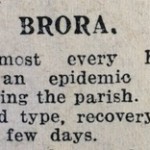
Back in the north Highlands, the John O’Groat Journal reported that Brora was in the grip of a flu epidemic: “Almost every household is afflicted by an epidemic of influenza which is sweeping the parish. Fortunately it is of a mild type, recovery from which is made in a few days.”
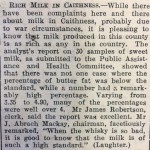
The paper also noted that Caithness milk remained of a high quality: “While there have been complaints here and there about milk in Caithness, probably due to war circumstances, it is pleasing to know that milk produced in this county is as rich as any in the country.” An analyst’s report showed that “there was not one case where the percentage of butter fat was below the standard, while a number had a remarkably high percentage.” As the Chairman of the Public Assistance and Health Committee joked, “’When the [quality of wartime] whisky is so bad, it is good to know that the milk is of such a high standard.’ (Laughter)”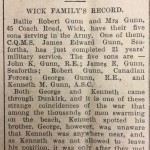
The John O’Groat Journal reported that Bailie Robert Gunn and his wife of Wick had all their five sons serving in the armed forces. “Both George and Kenneth [Gunn] came through Dunkirk, and it is one of these strange coincidences of the war that among the thousands of men swarming on the beach, Kenneth spotted his brother. George, however, was unaware that Kenneth was anywhere near and, as Kenneth was not allowed to leave his position, it was only after they met in Britain that George learned that he had been seen.”
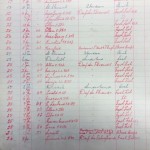
Finally this week, we thought we’d illustrate the devastating changes wrought by the war to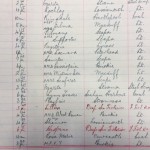 Wick as a fishing port. Here are two entries from the ledger of the sailings from Wick Pierhead. One is from January 1939, and the entries show a profusion of boats landing fresh fish from the Deep Sea Fisheries. The other is from January 1943, and this time the vessels are overwhelmingly Admiralty vessels, or ships in the service of the Forces: there are only one or two fishing boats, and they are almost all foreign.
Wick as a fishing port. Here are two entries from the ledger of the sailings from Wick Pierhead. One is from January 1939, and the entries show a profusion of boats landing fresh fish from the Deep Sea Fisheries. The other is from January 1943, and this time the vessels are overwhelmingly Admiralty vessels, or ships in the service of the Forces: there are only one or two fishing boats, and they are almost all foreign.
